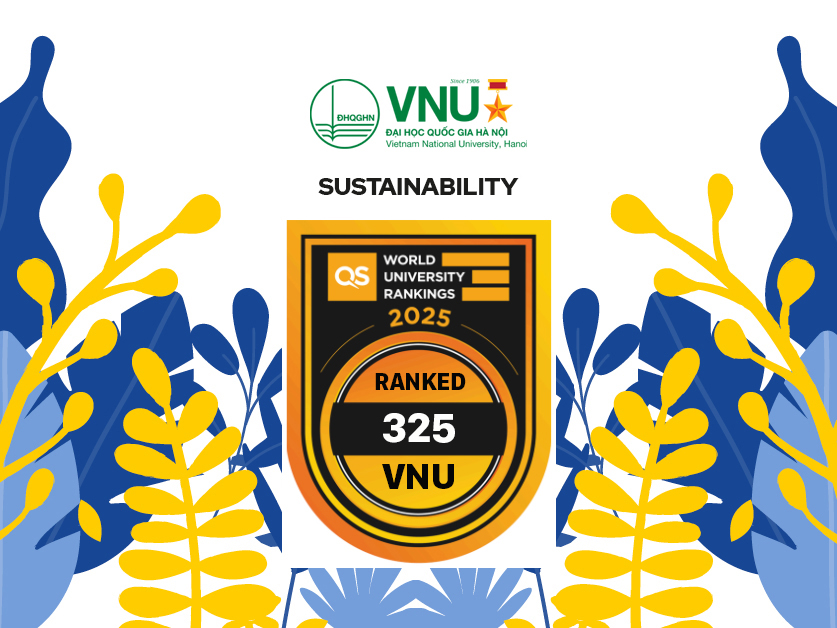
The QS WUR: Sustainability provides a unique perspective on higher education institutions that are committed to pursuing sustainable development linked to national responsibility. It comprehensively evaluates universities worldwide based on their commitment to and impact on sustainable development through research, teaching, and community service. This ranking highlights the extent to which universities contribute to Environmental Impact, Social Impact, and Governance. According to the QS WUR: Sustainability 2025, VNU improved its scores across all the indicators under Governance, Environmental Impact, and Social Impact. Specifically,

- VNU’s Governance, ranked 204th globally based on its commitment to transparency, ethics, accountability, and efficiency in governance and organizational operations;

- VNU’s Environmental Impact, ranked 364th globally based on its efforts to change the world towards the better through research in environmental science, climate change, and the impact of alumni;

- VNU’s Social impact, ranked 399th globally based on its action programs aimed at improving society, sharing knowledge, and training socially responsible graduates.
.jpg)
The contributions of VNU to building a more sustainable future environment and society are clearly reflected through its significant rise across all this year’s ranking criteria; namely Environmental education, Environmental research, Environmental sustainability, Employability and Opportunities, Equality, Good health and Well-being, Impact of education, Knowledge exchange and Good governance. These results reaffirm VNU’s core strengths in governance, training, research on environmental sustainability, and knowledge exchange. Notably, in this ranking, VNU’s Knowledge exchange was ranked 189th globally - its highest rank (264 places up compared to 2024). This shows VNU's significant influence on research collaboration with academic communities both domestically and internationally in sharing knowledge to promote educational growth and get ready for global research partnership. Additionally, VNU’s Equality was ranked 340th, and its Environmental education was ranked 350th globally.
This year’s ranking results once again demonstrate the correct governance approach of VNU’s leadership as well as the efforts of all its staff, scientists, and students in creating and disseminating new knowledge, conducting cutting-edge scientific research, committing to education for sustainable development and community engagement. VNU’s governance strategy ensures that sustainable development becomes an integral part of VNU's management culture, fulfilling the mission of a contemporary higher education institution in contributing to the common prosperity. VNU’s ranking results also serve as a significant contribution to the implementation of Resolution 45-NQ/TW dated November 24, 2023, on "Enabling a number of research and higher education institutions to feature among Asia’s top universities, and VNU to rank among the world’s top 500 universities" by 2030.
Ranking methodology:
Category | Lens | Indicator | Weight |
Environmental Impact | Environmental Education | Evaluation of the Provision and Impact of Teaching on Sustainable Development in Higher Education Institutions | 17% |
Environmental Research | Evaluation of the Environmental Research Impact of Higher Education Institutions on Sustainable Development Goals 7, 11, 12, 13, 14, and 15 | 13% | |
Environmental Sustainability | Evaluation of the strategies and activities of higher education Institutions towards a sustainable environmental future | 15% | |
Social Impact | Employability and Opportunities | Evaluation of the outcomes of higher education institutions in providing employment opportunities, reputation, and research partnerships with businesses | 11% |
Equality | Evaluation of the efforts and impact of higher education institutions' commitment to equality | 12% | |
Health and Wellbeing | Evaluation of the commitment of higher education institutions in improving the health and well-being of students in particular and society in general | 5% | |
Impact of Education | Evaluation of the provision of quality education and research and the impact of these activities | 7% | |
Knowledge Exchange | Evaluation of how higher education institutions collaborate in research between developed and developing regions to share knowledge and promote educational growth, as well as the positive impact of higher education institutions on local communities and society | 10% | |
Governance | Good Governance | Evaluation of the effectiveness of governance activities in higher education institutions through indicators of transparency and accountability in governance; commitment to ethical and cultural values in governance; student participation in governance activities; contributions to policy and social responsibility in sustainable development; governance effectiveness. | 10% |
